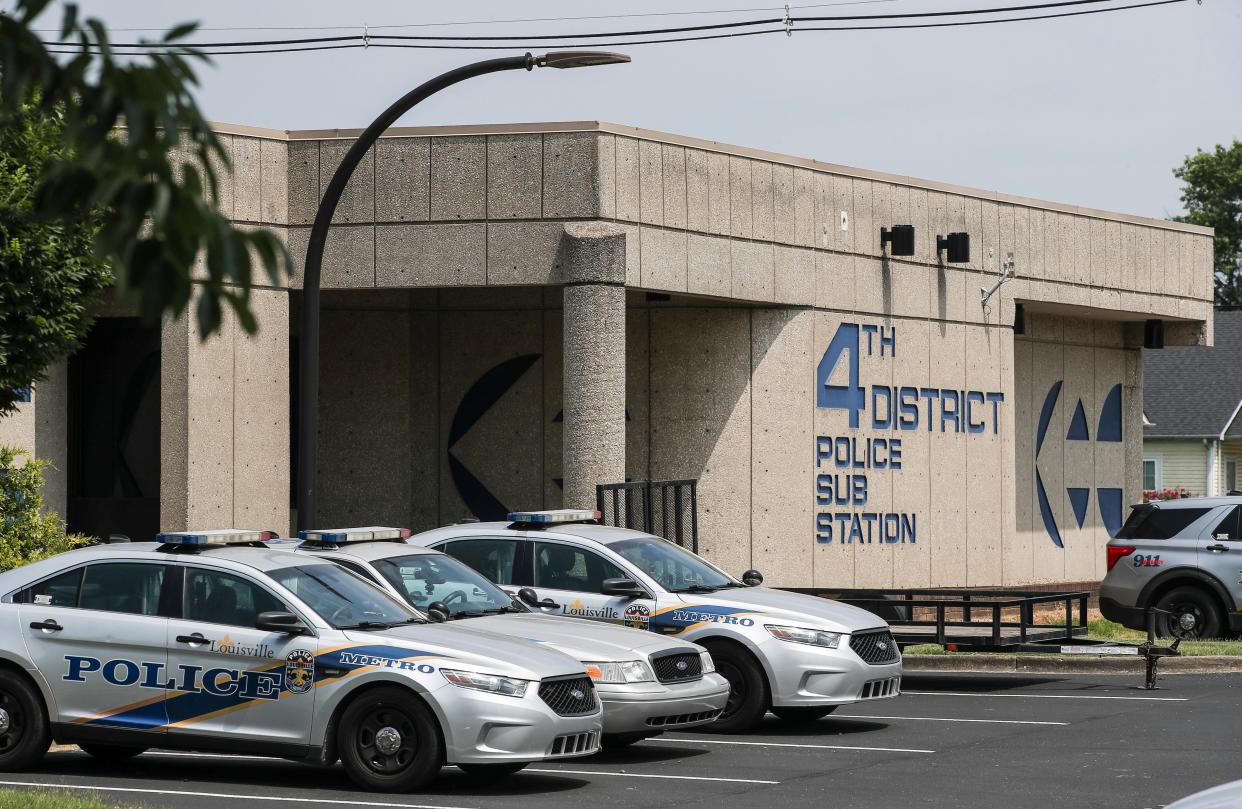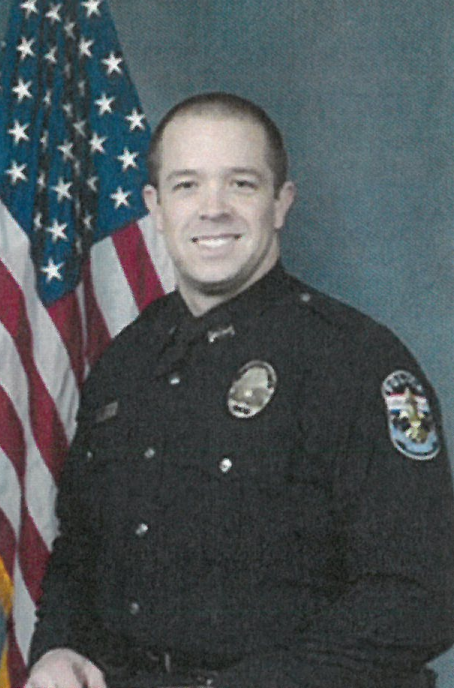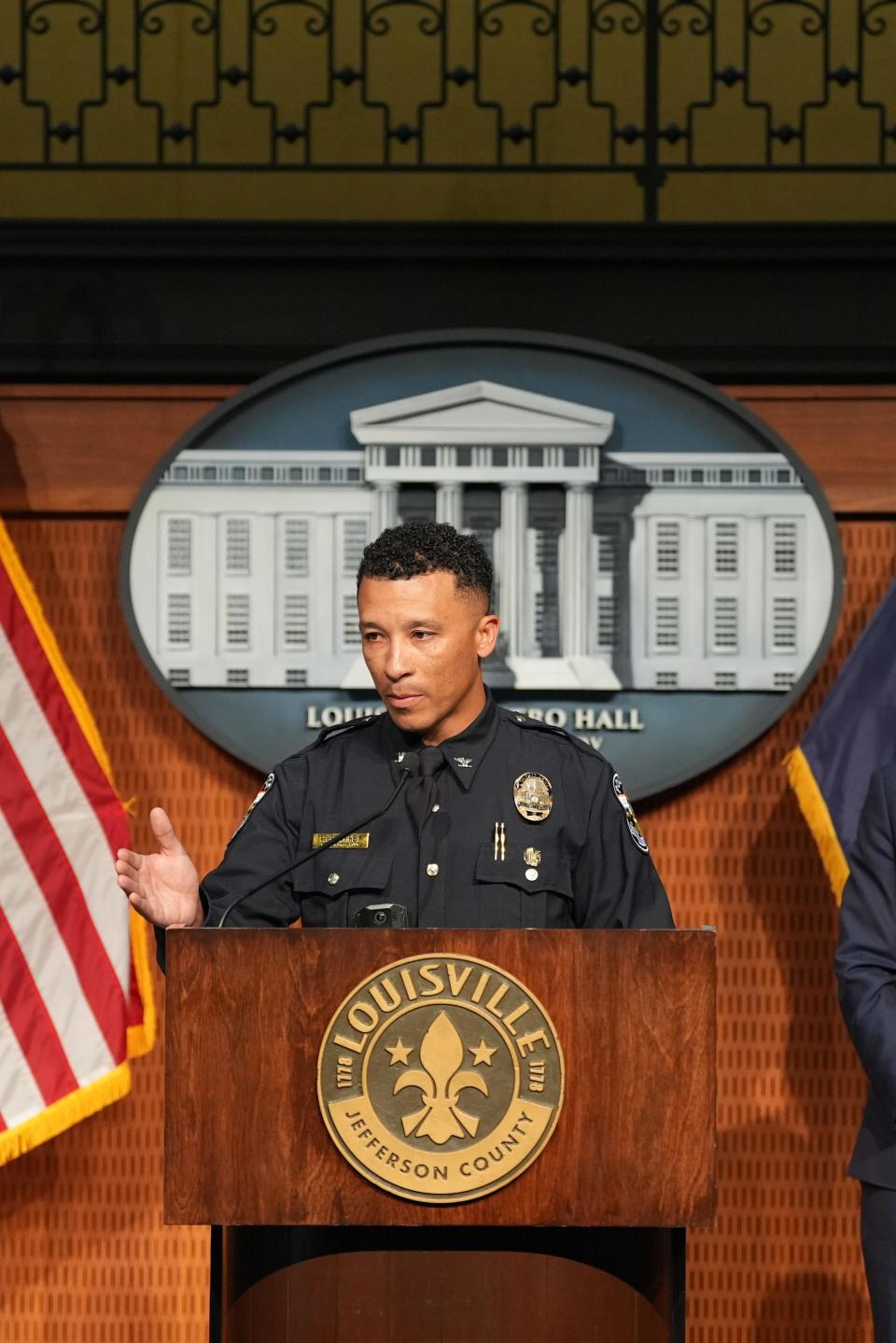'Patriarchal, misogynistic culture': How sexual misconduct proliferated at LMPD

Editor's note: This story includes language that may not be suitable for all audiences.
A little more than a month after Louisville Metro Police’s Explorer Scout program shut down amid investigations into sexual abuse of children by officers, a detective with the department’s elite Ninth Mobile Division sent a text message to a confidential informant.
“So when you gonna let me hit it?” he wrote in 2017, later cautioning the woman to be careful as her “name was floating around again.”
Days later, when the detective’s commander learned of the texts, he ordered him to explain himself.
The commander wrote that the detective acknowledged his messages were “inappropriate,” but that they reflected “banter” with the informant. In files reviewed by The Courier Journal, there is nothing to suggest a broader probe into the incident was ordered at the time.
More than two years later, the informant would tell internal affairs investigators she feared she would be arrested if she rebuffed the detective’s sexual advances, but decided not to have sex with him despite the risk.
In 2022, the detective who sent the texts — Bryan Wilson — was sentenced to federal prison for the 2018-19 drinks-throwing ‘Slushygate’ attacks and a 2020 scheme where he used police technology to help hack and sexually extort women.
The previously unreported episode involving the informant is one of a long list of sexual misconduct cases at LMPD, which in recent years, have included cases where the city agreed to pay millions of dollars to settle lawsuits over officers allegedly sexually assaulting civilians, coercing informants into sex and sending unwanted nude photos to colleagues.
Over the past five weeks alone, three additional high-profile allegations — including ones against top officers — have shaken LMPD and led to the ouster of Chief Jacquelyn Gwinn-Villaroel.
In their wake, the department quickly revised its sexual harassment policy and promised to do better, with Interim Chief Paul Humphrey saying there would be a “zero-tolerance policy” going forward.
But in recent years, sexual misconduct has proliferated at LMPD, with both officers and civilians as the victims. And last year, the U.S. Department of Justice determined LMPD “does not adequately investigate” reports of sexual misconduct by officers, or reports of intimidation or retaliation against women who sound the alarm on sexual harassment.
A Courier Journal review of hundreds of pages of discipline documents uncovered previously unreported sexual misconduct cases while shedding new light on others. It also found:
Some cases were not fully investigated;
Misconduct was not always met with serious consequences;
Those who spoke about sexual misconduct were often subjected to threats of retaliation.
LMPD declined to make a representative available for an interview, but provided brief answers to some detailed written questions. In a statement to The Courier Journal, LMPD spokesman Aaron Ellis said: “We cannot speculate about why certain decisions were made by former LMPD chiefs in years past; however, to strengthen LMPD’s response to sexual harassment allegations, an enhanced multi-tiered approach was immediately implemented on June 25th.”
To Ivonne Roman, a former Newark, New Jersey, police chief who now heads the 30x30 Initiative, an organization dedicated to boosting the number of women police recruits, permissive attitudes toward sexual misconduct can be indicative of broader problems in a department.
“If the culture is one where things are ignored, or if someone behaves in a boorish manner, and they get giggles instead of pulled to the side by their management, it’s going to create a poor environment that not only breeds opportunities for sexual harassment, but for misconduct, for abusing citizens,” she said. “It all goes hand-in-hand. If that type of behavior is allowed, what other kind of behavior is ignored or allowed to fester?”
'Protecting and serving'
Wilson’s unit, Ninth Mobile, was the descendent of VIPER, a plain clothes street enforcement unit that disbanded in 2015.
VIPER’s commander came under investigation in 2014 for repeatedly exposing his genitals to subordinates in a move he called the “Texas Belt Buckle.”
At one point, there was a ballistic shield — equipment used to protect officers during raids — in VIPER’s office with a drawing of a penis on it and the words “here we cum.”
Images of penises were a common sight in the office, with one officer saying there were “probably too many to count” at times.
At Ninth Mobile, misconduct would continue.

According to documents obtained under Kentucky's open records law, investigations into Wilson determined he was posting pornographic photos online, including ones taken at Ninth Mobile's former headquarters at 635 Industry Road, in his department-issued Ford F-150 and with another officer.
Wilson uploaded one in-uniform picture of his penis to Reddit with the title "protecting and serving."
Alongside a photo of a female officer in an LMPD uniform performing oral sex on him, he commented the sex act is how you “move up in most professions.” He titled the post “Slutty Cop hard at work.”
The investigation wrapped up after Wilson had already resigned. In October 2020, Interim Chief Yvette Gentry said he would have been fired had he not resigned.
Despite confirming he was taking pornographic images on LMPD property months before he resigned, no immediate discipline was issued.
The 2019 criminal investigation into Wilson’s contact with informants was dropped as the statute of limitations had expired.
According to the Bureau of Prisons website, Wilson was released from federal prison last week after serving a sentence for his roles in Slushygate and the 2020 ‘sextortion’ hacking scheme.
Prosecutors said he used abusive language toward women whose accounts had been hacked and threatened to send stolen sexually explicit content of them to families and employers unless they sent him more. One woman, a schoolteacher, told a federal judge she was driven to the brink of suicide.
Last year, Louisville Metro Government agreed to pay two of Wilson’s extortion victims $240,000 to settle lawsuits.
Louisville attorney Brian Butler, who represented Wilson when he faced federal charges, said Wilson is no longer a client, and as such, it would not be appropriate for him to comment.
‘No one wants to come into your office and file a complaint’
As Wilson was under investigation in 2019, the department’s internal affairs branches received an anonymous email alleging Sgt. Anthony Nunn of LMPD’s Fourth Division was showing subordinates a pornographic photo from the investigation.
“I am one of at least 3 female officers that work for Anthony Nunn, who are sick and tired of his behavior,” the person wrote, according to documents obtained under Kentucky's open records law.
They said Nunn had the photo saved on his phone and had shown it at roll calls, as well as at a “Friendsgiving” party.
“No one wants to come into your office and file a complaint or report sexual harassment, mainly because we don’t want our name associated with it,” the person wrote. “But at the same time we want something done. His phone has what you need and the majority of the platoon is going to tell you everything you need to know if you call us in as a witness.”
Over the next few months, investigators would interview 17 officers in Nunn’s squad. Most interviews lasted just two or three minutes, with most officers denying the allegations and investigators asking few, if any, follow-ups.
But one officer — Blake Cooper — said Nunn had shown him the photo after roll call one day.
Cooper also told investigators “everybody had it on their phones,” but they did not press him for additional details.
A female officer who appeared in photos posted online by Wilson told investigators Nunn offered to show a photo from the investigation to officers at roll call. She said she left the Friendsgiving party after he made the same offer.
However, in February 2020, Sgt. Andrew Hawkins, who was investigating the complaint, determined the allegations were not sustained.
Months later, Fourth Division Commander Maj. Tim Burkett wrote to then-Interim Chief Robert Schroeder expressing concerns about those findings. Given the sworn statements, Burkett wrote, Nunn had either violated policy “or further investigation is necessary to obtain clarity of what Officer Cooper viewed” on Nunn’s phone.
More than six months later, LMPD’s new chief — Erika Shields — closed the case, determining the allegations were not sustained. Files reviewed by The Courier Journal did not indicate additional investigation following Burkett’s concerns.
Speaking to investigators, Nunn denied showing subordinates a photo from the Wilson investigation. Asked if he’d seen the photo, he said he saw a “zoomed-in photo and all you could see was a fingernail if I’m not mistaken.”
Investigators did not push for additional details.
Speaking to The Courier Journal last week, Nunn denied showing any photo from the investigation to his officers and said he had explored trying to file a defamation suit against the person who made the anonymous report or former Chief Steve Conrad, who initiated the investigation.
"I'm not stupid enough to show my subordinates anything like that," he said.
He said after officers talked about the Wilson investigation, he reminded them at a roll call that it was against policy to have sex on duty "and you're dumb if you record it and you put it on social media ... whoever's in that photo deserves to be fired."
Other investigations lacked thoroughness, as well.
In March 2023, an anonymous ethics tip violation accused a married LMPD couple of sexually harassing and groping neighbors against their wishes at raucous parties in their neighborhood. The complainant alleged the couple made "vague threats" to attendees "to keep their mouth shut" afterward.
Special Investigations Division Commander Maj. Brian Kuriger — who is currently on administrative leave pending investigation after a fellow major said he “sexually harassed” and “attacked” her — handled the complaint himself, but no formal breach of policy or criminal investigation was initiated.
Instead, he spoke to two neighbors named in the complaint as having been groped who denied wrongdoing and closed the case. In documents obtained by The Courier Journal, there is no mention of Kuriger trying to reach out to other witnesses — including a Jeffersontown Police officer who was allegedly groped and current and retired police officers who were named as witnesses to the events.
Culture of retribution: 'Who ratted?'
Allegations of sexual misconduct in LMPD often go hand-in-hand with retribution, or threats of it.
When an anonymous letter reported VIPER’s commander exposing himself, other officers expressed anger to investigators, with some labeling the person who sounded the alarm on misconduct a “coward.”
After allegations surfaced against Nunn, one subordinate told investigators a fellow officer texted “who’s the snitch? Who ratted?” to a group chat.

When internal affairs investigated one supervisor’s relationships with subordinates last year, one detective told investigators a colleague went around the office saying “we gotta shake the snake out and we all gotta get our stories straight.”
In a lawsuit last month, officer Christine Silk — who alleged an LMPD trainer suggested she “whore herself out for childcare” and said she was sent unwanted photos of a field training officer’s penis after rebuffing his advances — said she became the subject of widespread rumors after filing sexual harassment complaints.
The lawsuit said officers had been "told to stay away from (Silk) because she has filed ‘three to four’ sexual harassment complaints already, while she is still on probation, and 'will report officers for anything.'"
In a separate lawsuit last month, Sgt. Lauren Carby said she faced retaliation and was passed over for positions for which she was qualified after declining unwanted sexual advances and reporting misconduct.
“Lauren realized that the last years would have been tremendously easier for her professionally if she had simply slept with Jeff Lauder in 2020,” the lawsuit said, referencing the husband of her then-supervisor, Shannon Lauder.
(Shannon Lauder is the major who made allegations against Kuriger. Along with her husband, she is currently on administrative leave pending the investigation of Carby's allegations).
Roman, the former Newark police chief, said fears of retaliation for officers reporting misconduct are real.
“Research has shown that that’s a true fear: That they will be ostracized by their peers, that their complaints won’t be taken seriously or won’t be investigated, or that there will be retribution against a complainant themselves,” she said.
Speaking to The Courier Journal, a civilian employee of LMPD described a “patriarchal, misogynistic culture” permeating the department, where speaking up about misconduct can lead to retaliation.
“If you know that ultimately the top person in your division is going to speak poorly of you, why would you feel comfortable reporting anything? Why would you in any way feel it’s a safe space to do anything?” the employee said, adding that women who raise issues within the department are “immediately called ‘dramatic’ or ‘extra’ or ‘bitch,’” the majority of the time.
There is an additional reluctance to speak up, they said, because there is little faith that issues will be properly addressed.
The employee spoke to The Courier Journal on the condition of anonymity because they were not authorized to speak to the media and feared retaliation.
Samantha Simon, an assistant professor of sociology at Arizona State University, spent a year observing and taking part in four police academies in a southern state, which she agreed not to name as a condition of her access.
She told The Courier Journal she was repeatedly sexually harassed by training officers who talked explicitly about her body and asked inappropriate personal questions.
“It’s definitely common for misogyny, sexism and just generally sexualizing women in these policing spaces,” she said.
Cadets, Simon said, are in a “powerless position” in police departments and can be easily fired, making reporting misconduct a risky proposition.
LMPD revamps policy, promises change
With several recent allegations of sexual misconduct, LMPD investigators determined the actions did not fit LMPD policy.
Last year, Silk made an internal-affairs complaint against trainer Dale Cottongim over comments he made to her.
Investigative findings provided to The Courier Journal under Kentucky’s open records law did not reference the “whore herself out” comment alleged in the lawsuit last month, but did reference comments made by Cottongim asking whether Silk’s child was from a one-night stand and suggesting she “hook up with someone and go on a date” to get child care.
While internal affairs investigator Leah Schweitzer determined Cottongim violated the department’s policies on conduct unbecoming and courtesy, she wrote his comments did not violate the sexual harassment policy.
“The comments did not appear to be so severe or pervasive that they unreasonably interfered with Recruit [Silk’s] work performance, nor did the comments appear to create a sexually intimidating, sexually hostile or sexually intimidating work environment, as outlined in policy,” Schweitzer wrote.
Asked if the case would be handled differently under LMPD’s revised sexual harassment policy, Ellis said: “We will not speculate on how the investigation would be handled now.”
In another case, investigators were limited by the lack of policy governing alleged misconduct.
Last year, after an anonymous ethics complaint alleged a sergeant had an “inappropriate relationship” with two detectives under his command, an internal affairs investigation was initiated.
While there was an allegation of a sexual relationship, that was not examined by internal affairs as “there was not an LMPD policy specifically prohibiting a supervisor from having a relationship with a subordinate,” an investigator wrote in January.
Under a new policy put in place in March, supervisors are prohibited from having relationships with people under their command.
Ellis told The Courier Journal the policy was put in place “in complying with best practices.”
After the spate of sexual misconduct allegations surfaced in June, Humphrey, the interim chief, issued a special order on his first day broadening the definition of sexual harassment to explicitly include things like sexual jokes and innuendo, displays of sexually suggestive items in the workplace environment, commentary about an individual's body and leering, whistling or touching.
The mayor’s office also said officers will be able to report instances of sexual misconduct without having to go through their chain of command.
But policy only goes so far.
“It’s really important when a chief puts out a sexual harassment policy, that it’s not just a piece of paper that they wave in court and say ‘oh yes, we have a policy,’” Roman said. “It’s not a policy if you don’t enforce it.”
Last week, amid the heightened attention to how LMPD handles reports of sexual misconduct, the agency turned to its official Facebook page asking for information about a man who had reportedly been driving around exposing himself to women.
"Not the crime of the century but annoying nonetheless," the department wrote in a post that was later edited to remove that language.
Reach reporter Josh Wood at jwood@courier-journal.com or on X, formerly known as Twitter, at @JWoodJourno.
This article originally appeared on Louisville Courier Journal: Louisville Metro Police sexually charged culture developed over years

